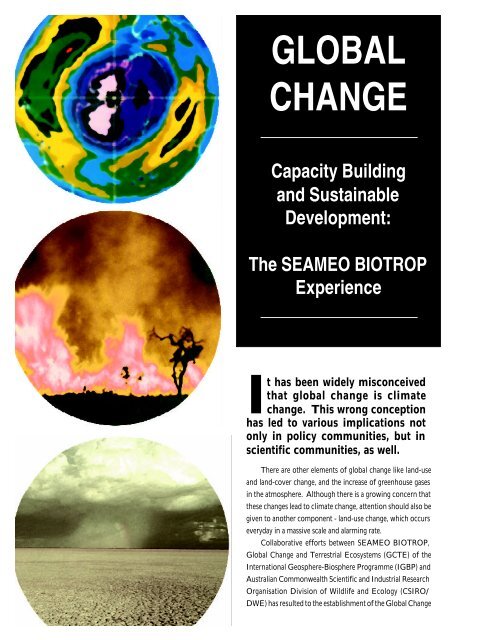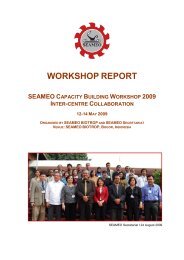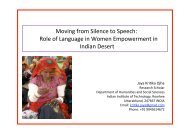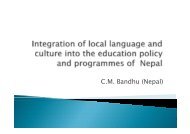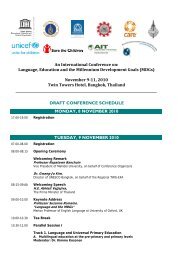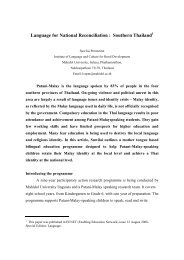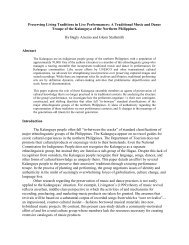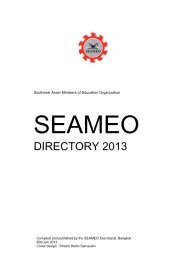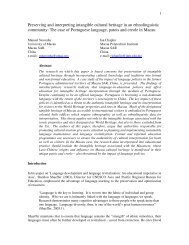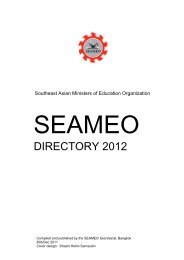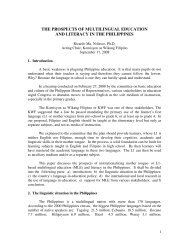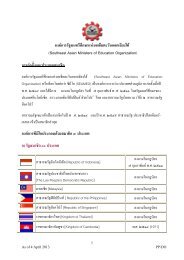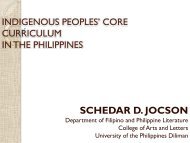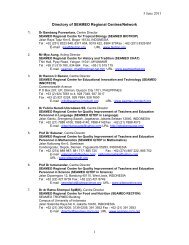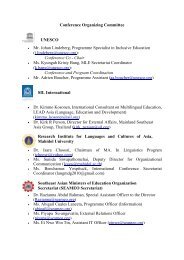Global Change Impacts Centre for Southeast Asia (IC-SEA) - SEAMEO
Global Change Impacts Centre for Southeast Asia (IC-SEA) - SEAMEO
Global Change Impacts Centre for Southeast Asia (IC-SEA) - SEAMEO
Create successful ePaper yourself
Turn your PDF publications into a flip-book with our unique Google optimized e-Paper software.
GLOBAL<br />
CHANGE<br />
Capacity Building<br />
and Sustainable<br />
Development:<br />
The <strong>SEA</strong>MEO BIOTROP<br />
Experience<br />
It has been widely misconceived<br />
that global change is climate<br />
change. This wrong conception<br />
has led to various implications not<br />
only in policy communities, but in<br />
scientific communities, as well.<br />
There are other elements of global change like land-use<br />
and land-cover change, and the increase of greenhouse gases<br />
in the atmosphere. Although there is a growing concern that<br />
these changes lead to climate change, attention should also be<br />
given to another component - land-use change, which occurs<br />
everyday in a massive scale and alarming rate.<br />
Collaborative ef<strong>for</strong>ts between <strong>SEA</strong>MEO BIOTROP,<br />
<strong>Global</strong> <strong>Change</strong> and Terrestrial Ecosystems (GCTE) of the<br />
International Geosphere-Biosphere Programme (IGBP) and<br />
Australian Commonwealth Scientific and Industrial Research<br />
Organisation Division of Wildlife and Ecology (CSIRO/<br />
DWE) has resulted to the establishment of the <strong>Global</strong> <strong>Change</strong>
<strong>Impacts</strong> <strong>Centre</strong> <strong>for</strong> <strong>Southeast</strong> <strong>Asia</strong> (<strong>IC</strong>-<strong>SEA</strong>). With a threeand-a-half<br />
year funding support from the Australian Agency<br />
<strong>for</strong> International Development (AusAID), <strong>IC</strong>-<strong>SEA</strong> started<br />
its operations at <strong>SEA</strong>MEO BIOTROP, Bogor, Indonesia in<br />
1995.<br />
The hosting of the <strong>Impacts</strong> <strong>Centre</strong> at <strong>SEA</strong>MEO<br />
BIOTROP is in line with its thrust on Tropical Ecosystems<br />
and Environmental <strong>Impacts</strong>. <strong>IC</strong>-<strong>SEA</strong> is the first regional<br />
centre in the developing regions established to assess the<br />
impacts of global change and their implications <strong>for</strong> the<br />
sustainable management of terrestrial ecosystems. Its objective<br />
is two-fold: (i) to assist scientists in <strong>Southeast</strong> <strong>Asia</strong> to build<br />
their own capacity in assessing the impacts of global change<br />
on terrestrial ecosystems, including agriculture, production<br />
<strong>for</strong>estry and nature reserve systems; and (ii) to promote<br />
planning <strong>for</strong> sustainable development and biodiversity<br />
conservation in a rapidly changing global environment.<br />
Regional Network and Capacity Building<br />
In developing its roles in capacity building, research<br />
coordination and policy support, <strong>IC</strong>-<strong>SEA</strong> has undertaken a<br />
set of integrated activities to produce a regional network of<br />
competent research teams composed of seven <strong>SEA</strong>MEO<br />
Member Countries: Indonesia, Malaysia, Cambodia, Thailand,<br />
Lao PDR, Viet Nam, and the Philippines. In collaboration<br />
with these teams, <strong>IC</strong>-<strong>SEA</strong> is now conducting a state-of-science<br />
analyses of the impacts of global environmental change on<br />
terrestrial ecosystems.<br />
<strong>IC</strong>-<strong>SEA</strong> uses integrated activities to achieve its objectives:<br />
training courses on aspects of impacts assessment, drawing<br />
on the expertise of GCTE scientists from around the world;<br />
visits by the <strong>Centre</strong> staff and affiliates to individual research<br />
groups in the region to give technical advice on data<br />
management, analysis and modelling; fellowship and<br />
equipment grants programs to support the development of<br />
the national teams; and the development of electronic<br />
in<strong>for</strong>mation systems to share data, models and discuss policy<br />
issues across the region.<br />
In the past three years, the <strong>Impacts</strong> <strong>Centre</strong> has launched<br />
sets of activities around four themes. The first three dealt<br />
with global change impacts on specific ecosystems, namely:<br />
tropical <strong>for</strong>est dynamics and production, rice production, and<br />
complex agroecosystems. The fourth considered the<br />
integration of these with the conservation of biodiversity at<br />
the landscape scale. In 1998, these were further extended with<br />
cross-cutting workshops on soil environment, and pest and<br />
diseases.<br />
Training Workshops<br />
Six training workshops have been conducted over three<br />
years with 152 participants from the seven countries. Training<br />
workshops were designed to provide teams with an overview<br />
of the analytical and modelling tools available to conduct<br />
impacts assessments. Trainers were chosen to represent a<br />
wide range of approaches and schools of thought. The course<br />
leaders and staff at the <strong>Impacts</strong> <strong>Centre</strong> work with the teams<br />
of participants from each country to help them match tools<br />
to their specific problems. Draft of country proposals are<br />
usually developed by the participants, dealing with global<br />
change problems in their respective countries and possible<br />
solutions through knowledge and tools explored during the<br />
workshop. The key output of training workshops is a set of<br />
proposals <strong>for</strong> further study.<br />
Fellowships<br />
The fellowship programme is <strong>for</strong><br />
scientists from <strong>Southeast</strong> <strong>Asia</strong> to conduct<br />
work relevant to the analysis of the impacts<br />
of global environmental change on<br />
terrestrial ecosystems. This includes<br />
support <strong>for</strong> participation in conferences<br />
and workshops as well as short to<br />
medium term study visits to global<br />
change laboratories around the world<br />
including the <strong>Impacts</strong> <strong>Centre</strong>’s internship<br />
sub-programme. Many fellowships have<br />
been granted to scientists who have<br />
participated in the training workshops or<br />
scientists who are part of the network of scientists<br />
making up the national teams. A total of 32 grants<br />
have been awarded.<br />
Equipment Grants<br />
Priority of the equipment grants programme has been<br />
given to supporting modelling and analytical studies, and<br />
complimenting, wherever possible, existing resources. The<br />
grants have, there<strong>for</strong>e, been largely <strong>for</strong> the purchase of<br />
computer hardware and software. The most typical<br />
configuration has been a quality desktop with a printer and<br />
software <strong>for</strong> statistical analysis, mathematical modelling and<br />
simulation, and geographical in<strong>for</strong>mation systems.<br />
Calls <strong>for</strong> proposals have been issued annually. Recipients’<br />
teams have typically included individuals who have previously<br />
participated in modelling workshops or the fellowship<br />
programme. The equipment is largely being used to carry out<br />
23
further advanced study and developing the impacts assessment<br />
proposals which arose out of the training workshops. The<br />
programme has been an essential component in the first phase<br />
of the <strong>Impacts</strong> <strong>Centre</strong> project, helping to provide some of<br />
the basic tools <strong>for</strong> teams in the region.<br />
Policy Support<br />
An important goal of the <strong>Impacts</strong> <strong>Centre</strong> is to ensure<br />
that its work is policy-relevant. It is essential that policymakers<br />
not only benefit but are also closely involved with the design<br />
and implementation of the <strong>Centre</strong>’s activities.<br />
Living with <strong>Global</strong> <strong>Change</strong><br />
External funds were sought and successfully obtained<br />
from the <strong>Global</strong> <strong>Change</strong> System <strong>for</strong> Analysis, Research and<br />
Training (START) to hold the first Science Policy Results<br />
Transfer workshop. In August 1996 the <strong>Impacts</strong> <strong>Centre</strong> hosted<br />
a highly successful workshop on Living with <strong>Global</strong> <strong>Change</strong>:<br />
Improving the Links between Science and Policy in <strong>Southeast</strong><br />
<strong>Asia</strong>. The workshop was instrumental in underlining the true<br />
complexities of the policy process <strong>for</strong> the scientific community.<br />
It also promoted testing of the strategy of continuous<br />
involvement of members of the policy community<br />
throughout the application development cycle to ensure that<br />
realistic needs were met.<br />
The outcome of this workshop was the creation of the<br />
<strong>Southeast</strong> <strong>Asia</strong>n Science Policy Advisory Network in <strong>Global</strong><br />
Environmental <strong>Change</strong> (<strong>SEA</strong>-SPAN). In May 1997, a<br />
discussion list (<strong>SEA</strong>-SPAN-L) and a web page hosted by <strong>IC</strong>-<br />
<strong>SEA</strong> were launched to support the network. The main role<br />
of <strong>SEA</strong>-SPAN-L to date has been to distribute in<strong>for</strong>mation<br />
about current news, events and in<strong>for</strong>mation sources of<br />
relevance to policy and large-scale environmental change in the<br />
region.<br />
Transboundary Haze<br />
In response to the 1997 transboundary haze and fires<br />
which affected human health, transportation and tourism in<br />
Indonesia, Singapore, Malaysia, Thailand and the Philippines,<br />
<strong>IC</strong>-<strong>SEA</strong> launched a series of activities to promote on-going<br />
collaboration between the scientific, resource management and<br />
policy communities in <strong>Southeast</strong> <strong>Asia</strong> entitled Land Use<br />
Planning and Management to reduce the impacts of<br />
transboundary pollution resulting from fires in <strong>Southeast</strong> <strong>Asia</strong>.<br />
The activities begun with a set of commissioned reviews,<br />
studies and scoping meetings, and proceeded through a series<br />
of small working group synthesis and satellite meetings, an<br />
electronic workshop <strong>for</strong> wider participation, and will end with<br />
a <strong>for</strong>um to be held in collaboration with the A<strong>SEA</strong>N Secretariat.<br />
The expected output is an on-going network with A<strong>SEA</strong>N<br />
involvement to tackle this and other large-scale environmental<br />
problems and promote better strategies <strong>for</strong> sustainable<br />
development of the <strong>Southeast</strong> <strong>Asia</strong>n region.<br />
Collaborative Research<br />
The <strong>Impacts</strong> <strong>Centre</strong>, through workshops and follow-up<br />
activities, has generated numerous proposals and plans <strong>for</strong><br />
further studies, some of which are now being incorporated<br />
into the research and development activities of participating<br />
institutions. Some of the ongoing collaborative researches<br />
are as follows: 1) assessing the impacts of climate variability<br />
on rice production in rain-fed areas of Northeast Thailand; 2)<br />
understanding the role of soil characteristics and land<br />
management practice in emitting or sequestering greenhouse<br />
gas; and 3) carbon stock in plantation <strong>for</strong>est.<br />
Looking Forward<br />
Collaborative research support and coordination will<br />
dominate the activities <strong>for</strong> the next phase. However,<br />
capacity-building and policy support activities will still be<br />
carried out as they play an important role in achieving the<br />
region’s sustainable development under global change.<br />
For more in<strong>for</strong>mation on <strong>IC</strong>-<strong>SEA</strong>, visit<br />
its website at<br />
http://www.icsea.or.id.<br />
24


